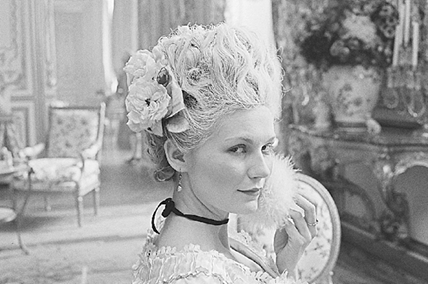Let them eat cake—I want candy
The opening moments of “Marie Antoinette” suggest that it will pick up where the Sex Pistols’ “God Save the Queen” left off, launching an angry assault on royalty. Kicking off with Marxist post-punk band the Gang of Four’s ferocious “Natural’s Not In It,” it illustrates their lyrics “The problem of leisure/What to do for pleasure” with images of Marie Antoinette (Kirsten Dunst) lying back, receiving a pedicure and eating cake. The soundtrack of “Marie Antoinette” is filled with late ‘70s and early ‘80s music with a similar spirit, although most of it’s less overtly political. By using songs dating from the rise of Reagan and Thatcher—and in large part, reacting against them—Coppola makes connections between the rise of conservatism in the ‘80s and the obliviousness of the 18th-century French court.
On one level, I’m sure she’s celebrating the music of her youth, but her use of it is particularly pointed. Siouxsie and the Banshees’ “Hong Kong Garden,” a song about Chinese immigrants toiling in suburban London take-out joints, becomes the soundtrack to a huge masked ball. Surely no one could miss the point of a montage set to Bow Wow Wow’s “I Want Candy,” in which Marie Antoinette tries on pair after pair of shoes while sipping champagne and eating pastry. Coppola lets the music carry most of the burden of her film’s social criticism, but unfortunately, it can only go so far to redeem this muddled project.
As “Marie Antoinette” begins, its heroine is 14. Living in Austria, she’s promised to Louis XVI (Jason Schwartzman), the heir to the French throne. She’s forced into a loveless marriage with him. Years pass before the two have sex. Even their everyday conversations are brusque and awkward. Concern spreads that she won’t produce an heir, but eventually she becomes pregnant. She throws herself into upper-class court life and an affair with Swedish Count Fersen (Jamie Dornan.)
As the sole American female director to rise from Indiewood to an Academy Award and studio patronage, Sofia Coppola’s in a strange position. “Marie Antoinette” marks the first time she’s approximated a feminist perspective; her first two films showed a much stronger identification with men. Early on, she emphasizes how Marie Antoinette is objectified. Twice, her nude body is put on public display. Her sex life is treated as if it were everyone’s business. She’s forced into an early motherhood for which she’s clearly unprepared.
As played by Dunst, Marie Antoinette is extremely sympathetic—too much for the film’s essential ambivalence to really take hold. The world in which she moves is decadent and corrupt, full of cynical backbiters, but she remains sweet and innocent. She’s shallow and vacuous, but she’s also quite likable and glamorous. Marie Antoinette’s resemblance to Paris Hilton, down to her love for tiny dogs, can’t be accidental. More often than not, “Marie Antoinette” makes life at Versailles look like a great deal of fun. Marie Antoinette ignores the problems of the poor in order to spend money partying, but the film may as well be told from her blinkered point of view. Acknowledging how privilege warps people, it still can’t help identifying with power.
To be sure, “Marie Antoinette” implies that her innocence comes at a high price. It only refers to world events like the American Revolution a few times—they’re Louis’ responsibility, but he seems to care about them only slightly more than Marie Antoinette does. Nevertheless, somebody must be running the government, exercising real political power. Here, the film’s present-day parallels go off the rails, as the Bush administration’s self-serving cocooning is far more cynical than Marie Antoinette’s.
In addition to its use of music, the most modern and interesting aspect of “Marie Antoinette” is Coppola’s treatment of actors. She’s assembled a large ensemble cast, including Rip Torn, Asia Argento, Marianne Faithfull and Steve Coogan. All of them retain their natural accents and varied performance styles. If Dunst suggests a spoiled California teenager transported to the past, Jason Schwartzman plays essentially the same awkward adolescent geek as in Wes Anderson’s “Rushmore.”
In interviews, Coppola insists that she has little interest in making a film about history or politics. These claims have fueled the many critics of “Marie Antoinette,” but I’m not sure that its conception was really as blithe as she suggests. Whatever her intentions, it’s impossible to make a truly apolitical film about Marie Antoinette’s life. Unfortunately, the film glamorizes its heroine far more than it critiques her. It may be skeptical about the rich, but it’s completely incapable of imagining the world from an ordinary person’s perspective. “Marie Antoinette” winds up endorsing the worst sexist stereotypes about ditzy blondes. Inadvertently, Coppola sings the praises of airheadedness rather than following through on the promise of her film’s first scene.
gaycitynews.com


































